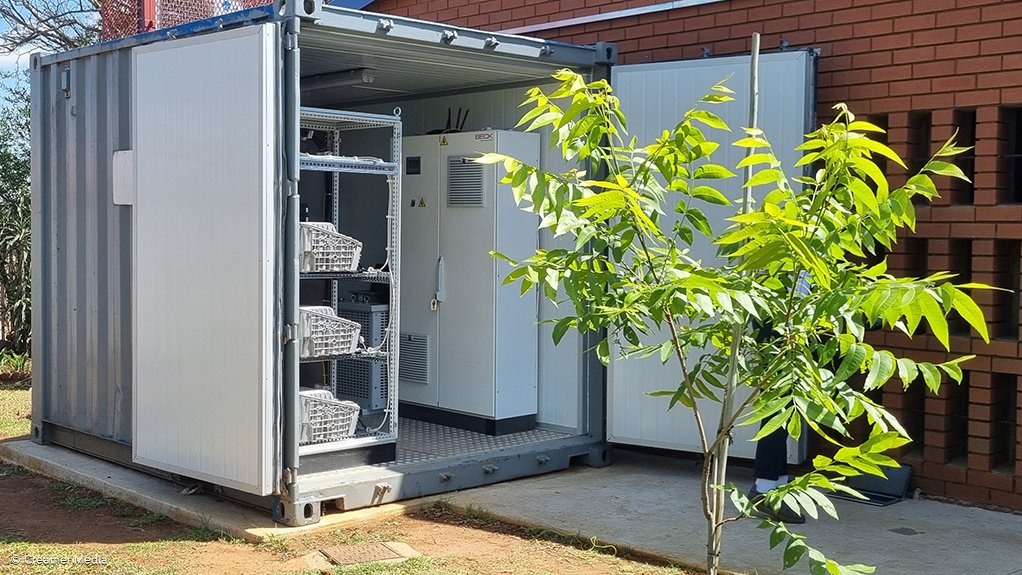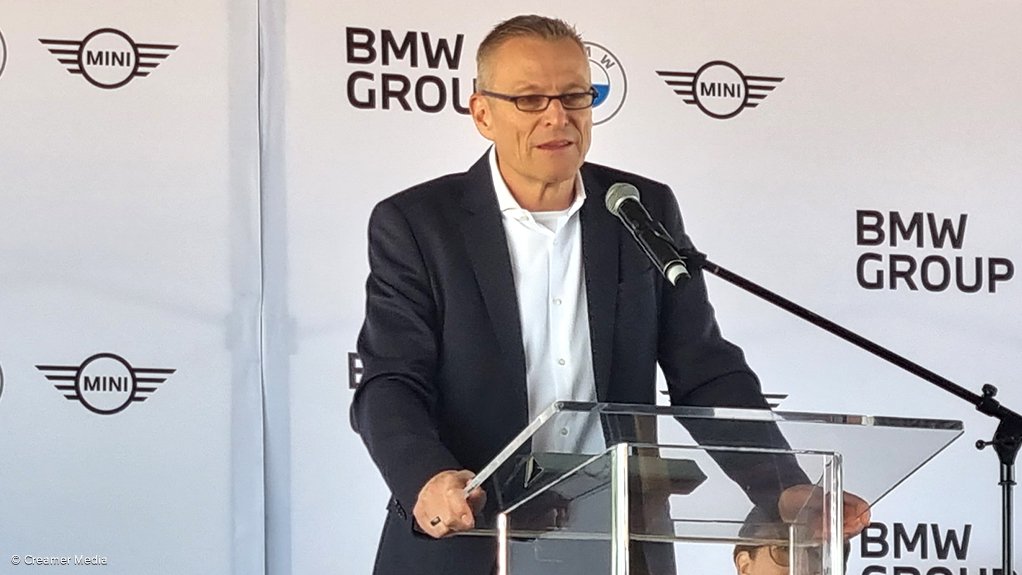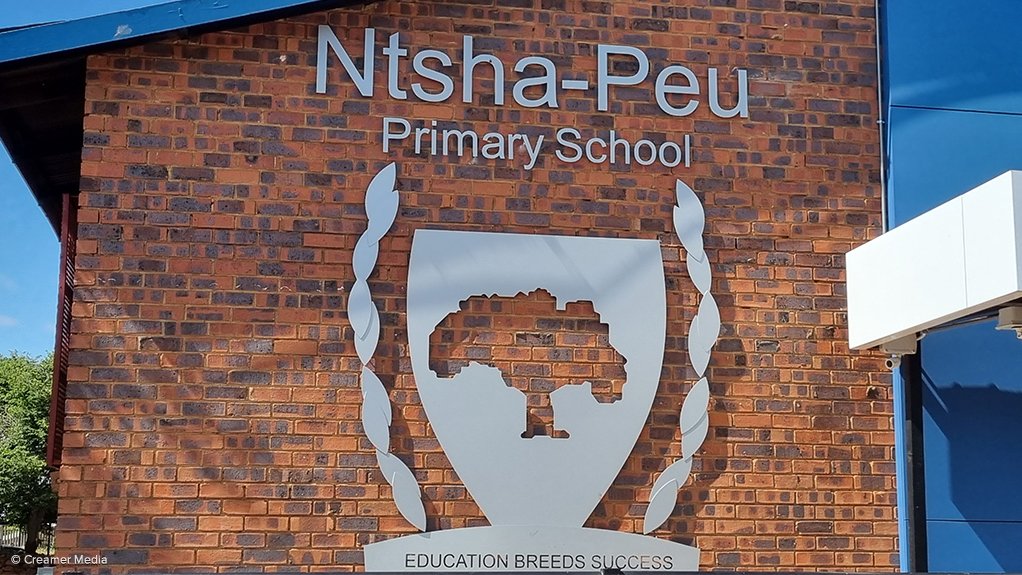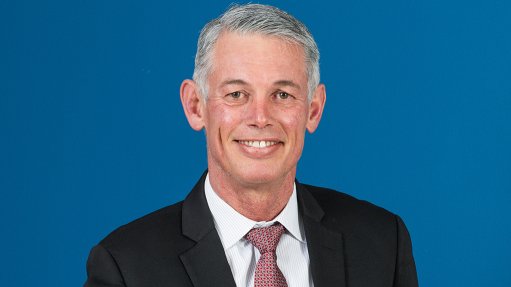BMW South Africa energy innovation advances Tshwane community's prospects




BMW South Africa's electric vehicle batteries being used to store electricity
Photo by Creamer Media's Marleny Arnoldi
BMW South Africa CEO Peter van Binsbergen
Photo by Creamer Media's Marleny Arnoldi
Ntshe-Peu Primary School
Photo by Creamer Media's Marleny Arnoldi
Automotive manufacturer BMW South Africa has unveiled a successful solar and battery energy storage pilot project at the Ntshe-Peu Primary School, in Shoshanguve, which incorporates batteries from the automakers X3 plug-in hybrid model vehicles.
The PowerUp pilot project was initiated to use the automotive batteries to provide renewable and high-quality second-life energy storage solutions for schools, as educational activities are often disrupted by loadshedding.
The combination of six X3 plug-in hybrid batteries as stationary storage and 165 solar photovoltaic rooftop panels saves about 40 t/y of carbon dioxide emissions and can support a maximum energy capacity of 42 kWh, which is enough to sustain a computer room, lights and other necessary infrastructure at the school.
On a regular school day, Ntshe-Peu uses 8 kWh of energy every hour.
The batteries used in the pilot project were derived from test vehicles produced by the BMW South Africa plant in Rosslyn, Pretoria.
By ensuring a longer lifecycle for these batteries through circular economy principles, BMW reduces its environmental impact, while advancing social empowerment imperatives.
After the batteries reach the end of their 20-year lives, BMW plans to extract the valuable metals within to produce new batteries.
During the development phase of PowerUp, BMW South Africa used a number of electric cars equipped with batteries that are suitable for re-use in energy storage applications. BMW South Africa partnered with the group’s recycling centre in Munich, Germany, as well as Beck Automation, to turn the six batteries into a high-quality stationary storage system.
Through this initiative, BMW South Africa is also learning more about the life and behaviour of its X3 plug-in hybrid batteries and aims to roll out more of these energy storage systems at schools in need.
BMW South Africa has supported the Ntshe-Peu Primary School since 2019, including through refurbishments and classroom expansions, which enabled the school to expand to 700 learners.
In particular, the computer lab sponsored by the group can accommodate 80 learners and offers coding and robotics learning capability, which not only provides a higher quality of education for learners, but ensures a skilled pipeline of learners for BMW South Africa in future.
Similarly, BMW South Africa has, together with United Nations Children's Fund, supported the nearby Lethabong Secondary School, in Soshanguve, with classroom expansions and the introduction of a coding and robotics learning programme.
The school originally accommodated 1 000 learners but has grown to accommodate 1 400 learners in recent years.
BMW South Africa is helping the school to become a maths, science and information, communication and technology school of specialisation, including through a coding and robotics programme.
BMW group labour relations director Ilka Horstmeier confirms that Lethabong is being positioned as a hub to coordinate a coding and robotics programme across more schools, with the BMW group targeting to train 1 000 teachers and thereby about 50 000 learners in coding and robotics.
BMW South Africa CEO Peter van Binsbergen says the group is passionate about advancing education, from early learning through to vocational training, employee development and leadership development.
Notably, BMW South Africa, through its Talent Pipelines strategy, seeks to address the challenges of youth unemployment and skills shortages by creating career development opportunities for young people.
In addition to its school support, BMW South Africa also has sponsorship and apprenticeship programmes in place, as well as various Youth Unemployment Service trainees.
At group level, BMW South Africa strives to make mobility more intelligent and more sustainable.
Article Enquiry
Email Article
Save Article
Feedback
To advertise email advertising@creamermedia.co.za or click here
Press Office
Announcements
What's On
Subscribe to improve your user experience...
Option 1 (equivalent of R125 a month):
Receive a weekly copy of Creamer Media's Engineering News & Mining Weekly magazine
(print copy for those in South Africa and e-magazine for those outside of South Africa)
Receive daily email newsletters
Access to full search results
Access archive of magazine back copies
Access to Projects in Progress
Access to ONE Research Report of your choice in PDF format
Option 2 (equivalent of R375 a month):
All benefits from Option 1
PLUS
Access to Creamer Media's Research Channel Africa for ALL Research Reports, in PDF format, on various industrial and mining sectors
including Electricity; Water; Energy Transition; Hydrogen; Roads, Rail and Ports; Coal; Gold; Platinum; Battery Metals; etc.
Already a subscriber?
Forgotten your password?
Receive weekly copy of Creamer Media's Engineering News & Mining Weekly magazine (print copy for those in South Africa and e-magazine for those outside of South Africa)
➕
Recieve daily email newsletters
➕
Access to full search results
➕
Access archive of magazine back copies
➕
Access to Projects in Progress
➕
Access to ONE Research Report of your choice in PDF format
RESEARCH CHANNEL AFRICA
R4500 (equivalent of R375 a month)
SUBSCRIBEAll benefits from Option 1
➕
Access to Creamer Media's Research Channel Africa for ALL Research Reports on various industrial and mining sectors, in PDF format, including on:
Electricity
➕
Water
➕
Energy Transition
➕
Hydrogen
➕
Roads, Rail and Ports
➕
Coal
➕
Gold
➕
Platinum
➕
Battery Metals
➕
etc.
Receive all benefits from Option 1 or Option 2 delivered to numerous people at your company
➕
Multiple User names and Passwords for simultaneous log-ins
➕
Intranet integration access to all in your organisation



















